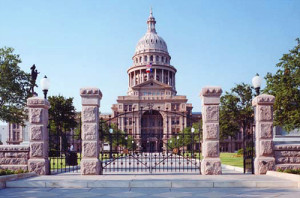Texas Criminal Legislative Update: March 30, 2015
The 84th Texas Legislative Session is in full-swing in Austin, and you may want to know what new laws our legislators are considering and which old laws might get a facelift.

Texas State Preservation Board
Committee hearings in both the House and Senate are well underway: some bills have been passed out of Committee, some have had hearings and were left pending in Committee, and many more are still awaiting a hearing. Over the next few weeks, we want to keep you updated on some noteworthy pieces of legislation moving through the committees as the Legislature marches towards Sine Die on June 1, 2015.
These bills have had a public hearing in the House Criminal Jurisprudence Committee and were left pending.
- HB 207 by Representative Jeff Leach (R-Plano) et al. creates a new offense called “Voyeurism.” If passed it would be a Class C misdemeanor for the actor to observe another person in a dwelling, structure or conveyance (e.g., vehicle) without that person’s consent while the actor has the intent to arouse or gratify the sexual desire of the actor OR to degrade or abuse any person. The new offense allows for increased penalties for repeat offenders, but would automatically be a State Jail Felony if the victim was younger than 14. Rep. Leach filed this bill last year but it did not clear the Senate before the end of Session.
- HB 225 by Representative Ryan Guillen (D-Rio Grande City) would create a defense to prosecution for certain drug offenses if the actor, in an overdose situation: requested emergency medical assistance for himself/herself or another person, remained on the scene until medical assistance arrived, and cooperated with medical assistance and law enforcement personnel. If implemented, this could help to ensure timely medical treatment for persons experiencing a drug overdose, and to assist the emergency personnel in obtaining accurate information about the overdosing person.
- HB 282 by Representative Harold Dutton (D-Houston, et al. is identical to Senator Whitmire’s SB 135 concerning Texas’ Grand Jury system (which we wrote about here and was passed by the Senate last week; it will now be referred to a House committee).
- HB 561 by Rep. Dutton would require the District Attorney to disclose to the Grand Jurors the result of any vote taken on an indictment by a previous Grand Jury. As it currently stands, the DA can present a case to a Grand Jury and the Grand Jury can return a “true bill” (the case is indicted) or a “no bill” (the case does not proceed); if that Grand Jury votes to no bill the case, the DA can represent it to the next Grand Jury without telling them that the previous Grand Jury already voted to no bill the case. This law would create transparency at the DA’s office and might prevent Grand Jury shopping.
- HB 1010 by Representative Terry Canales (D-Edinburg) codifies the Brady rules by creating a statutory duty for the prosecutor (District Attorney, County Attorney or Attorney General) to “identify any information or evidence that tends to negate the defendant’s guilt or mitigate the punishment for the offense and that is in the possession, custody, or control of the State.” Before taking a plea or beginning a trial, the court shall require the prosecutor to affirm in open court that they have (1) been diligent in identifying Brady material and (2) provided all Brady material to the defendant, regardless of whether the defendant requested the Brady material. Legislation such as this has been a long time coming, and is an extension of the Michael Morton Act which was passed last legislative session.
- HB 3312 by Representative Charlie Geren (R-Fort Worth) would allow persons arrested on suspicion of certain intoxication offenses to request that an additional blood specimen be drawn, and that specimen would be admissible at trial even if it was analyzed in a laboratory not accredited by the Texas Department of Public Safety.
These are some of the Senate bills we are watching, which have been referred to the Senate Criminal Justice Committee.
- SB 172 by Senator Joan Huffman (R-Houston) outlaws possess, manufacture, delivery or possession with intent to deliver 25-I, a synthetic drug which mimics the effects of LSD or ecstasy, placing it in Penalty Group 2. SB 173 outlaws possession, manufacture, delivery or possession with intent to deliver all forms of synthetic marijuana (also known as K2, Spice, etc.), placing it in Penalty Group 2-A. Both bills passed the Senate and have been referred to the House.
- SB 1630 by Senator Whitmire concerning juvenile offenders (which we wrote about here) will be heard in committee tomorrow.


